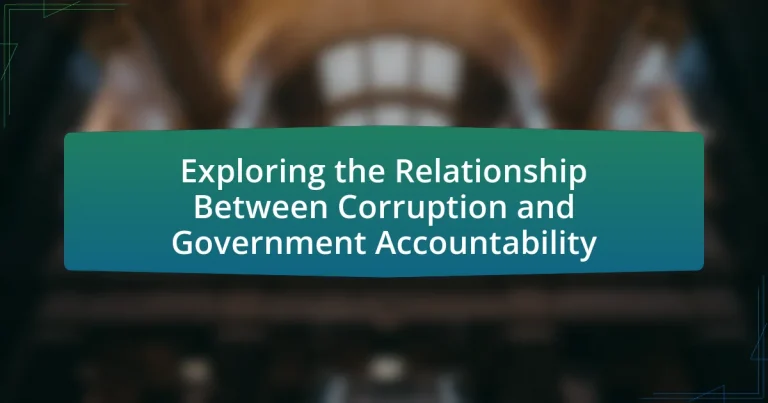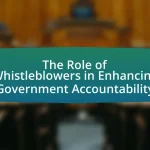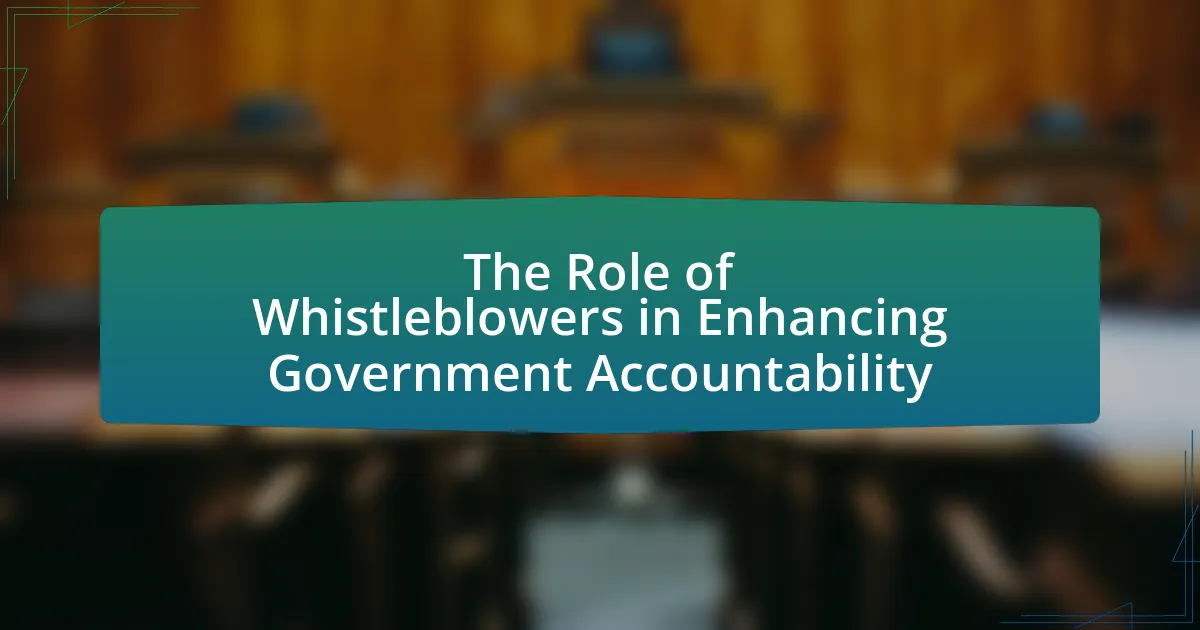The article examines the intricate relationship between corruption and government accountability, highlighting how corruption erodes public trust and undermines effective governance. It defines corruption as the abuse of power for personal gain and outlines various forms, including bribery, embezzlement, and nepotism, which significantly diminish accountability. The discussion emphasizes the importance of robust accountability mechanisms, such as transparency initiatives and independent oversight bodies, in combating corruption and restoring public confidence in government institutions. Additionally, it explores the role of cultural factors, citizen engagement, and technological solutions in enhancing accountability and reducing corruption levels across different political systems.
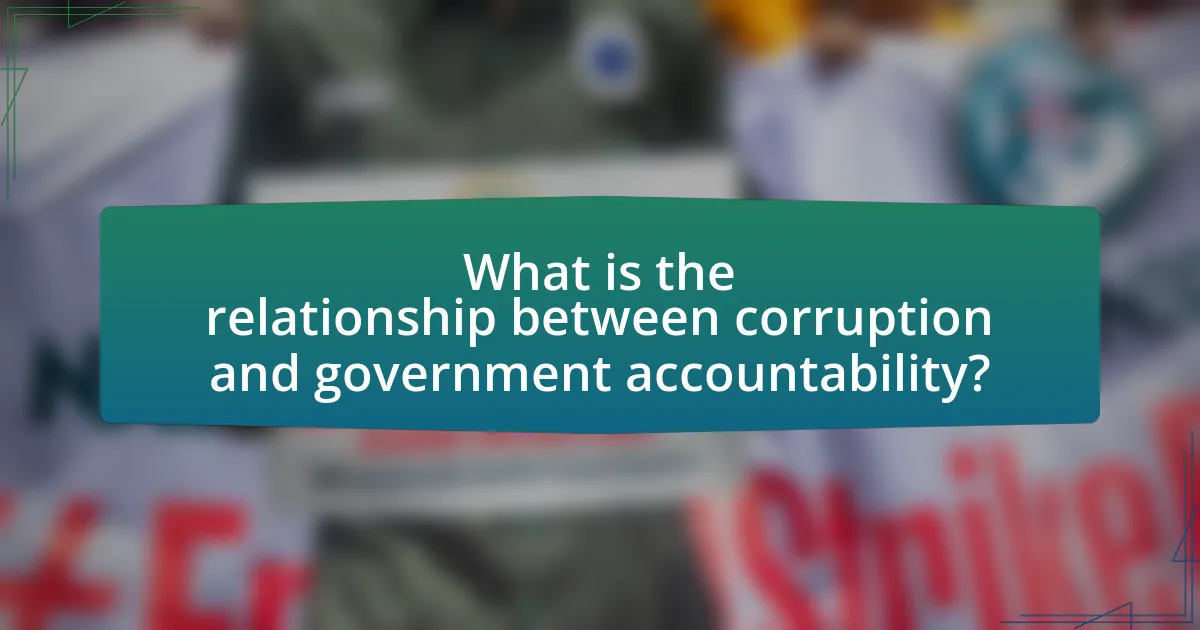
What is the relationship between corruption and government accountability?
Corruption undermines government accountability by eroding trust in public institutions and enabling misconduct without repercussions. When corruption is prevalent, officials may prioritize personal gain over public service, leading to a lack of transparency and diminished responsiveness to citizens. Studies, such as the World Bank’s 2017 report on governance, indicate that countries with high corruption levels often experience weaker accountability mechanisms, resulting in ineffective governance and increased public disillusionment. This relationship highlights the critical need for robust anti-corruption measures to enhance accountability and restore public confidence in government.
How do corruption and government accountability influence each other?
Corruption undermines government accountability by eroding public trust and enabling misconduct, while strong government accountability mechanisms can deter corruption by promoting transparency and ethical behavior. When corruption is prevalent, it creates a culture of impunity, where officials may act without fear of repercussions, leading to a lack of accountability. Conversely, effective accountability measures, such as audits, oversight bodies, and public reporting, can expose corrupt practices and hold officials responsible, thereby reducing opportunities for corruption. Research indicates that countries with robust accountability frameworks experience lower levels of corruption, as seen in the 2020 Corruption Perceptions Index, which correlates higher accountability scores with lower corruption levels across various nations.
What are the key definitions of corruption and government accountability?
Corruption is defined as the abuse of entrusted power for private gain, which can manifest in various forms such as bribery, embezzlement, and nepotism. Government accountability refers to the obligation of government officials and institutions to be answerable for their actions, ensuring transparency and responsiveness to the public. The relationship between these two concepts is critical; high levels of corruption often lead to diminished government accountability, undermining public trust and effective governance. Studies indicate that countries with strong accountability mechanisms tend to experience lower levels of corruption, highlighting the importance of transparency and oversight in mitigating corrupt practices.
How does corruption undermine government accountability?
Corruption undermines government accountability by eroding trust in public institutions and facilitating the misuse of power. When officials engage in corrupt practices, such as bribery or embezzlement, they prioritize personal gain over public service, leading to a lack of transparency and oversight. This behavior diminishes the ability of citizens to hold their leaders accountable, as corrupt officials often manipulate systems to evade scrutiny. For instance, according to Transparency International’s Corruption Perceptions Index, countries with high levels of corruption typically exhibit weak governance structures, which further perpetuates a cycle of unaccountability and inefficiency in public administration.
Why is understanding this relationship important?
Understanding the relationship between corruption and government accountability is crucial because it directly impacts the effectiveness of governance and public trust. High levels of corruption undermine accountability mechanisms, leading to inefficient resource allocation and diminished public services. Research indicates that countries with strong accountability frameworks experience lower corruption levels, as evidenced by Transparency International’s Corruption Perceptions Index, which shows a correlation between accountability and perceived corruption levels across nations. Thus, comprehending this relationship is essential for developing strategies to enhance governance and promote integrity in public institutions.
What are the implications of corruption on public trust?
Corruption significantly undermines public trust in government institutions. When citizens perceive corruption, they often believe that officials prioritize personal gain over public service, leading to skepticism about the integrity and effectiveness of governance. Studies indicate that high levels of corruption correlate with decreased public confidence; for instance, the 2021 Transparency International Corruption Perceptions Index revealed that countries with rampant corruption experience lower trust levels in government, impacting civic engagement and compliance with laws. This erosion of trust can result in reduced public participation in democratic processes, as citizens may feel disillusioned and disengaged from a system they view as corrupt.
How does government accountability affect corruption levels?
Government accountability significantly reduces corruption levels by ensuring that public officials are answerable for their actions. When governments implement mechanisms such as audits, transparency initiatives, and anti-corruption laws, they create an environment where corrupt practices are more likely to be detected and punished. For instance, the World Bank has reported that countries with higher levels of accountability experience lower corruption rates, as accountability measures deter officials from engaging in unethical behavior due to the risk of exposure and consequences.
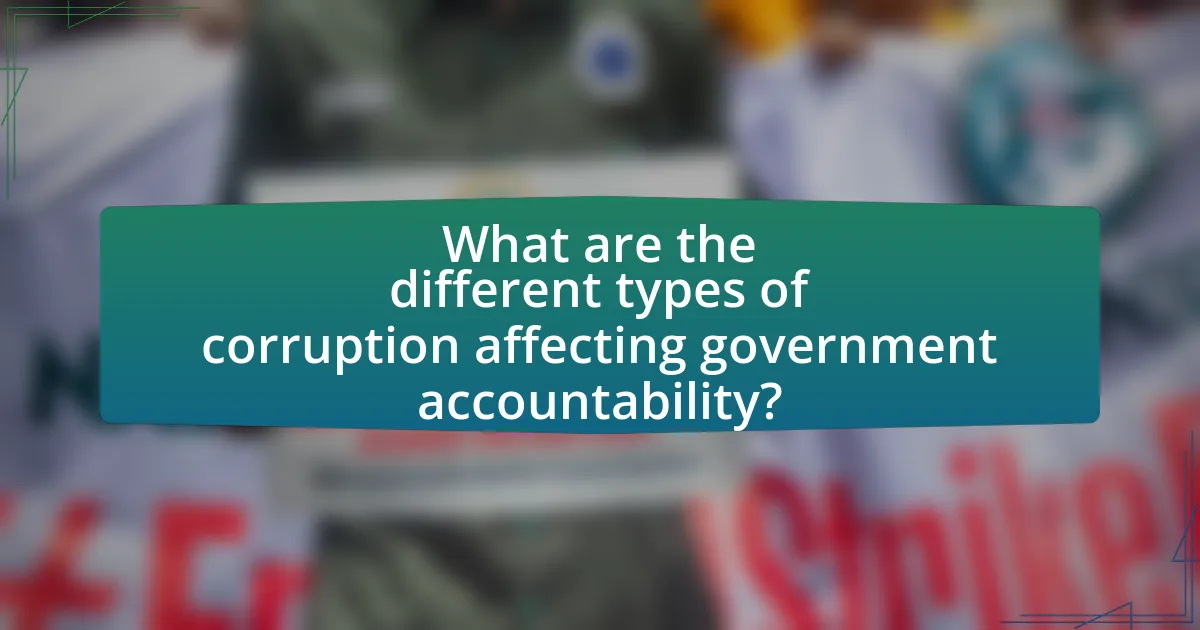
What are the different types of corruption affecting government accountability?
The different types of corruption affecting government accountability include bribery, embezzlement, nepotism, and fraud. Bribery involves offering, giving, receiving, or soliciting something of value to influence the actions of an official, undermining transparency and fairness in governance. Embezzlement refers to the misappropriation of funds placed in one’s trust, which directly impacts the financial integrity of government operations. Nepotism is the practice of favoring relatives or friends in hiring or promotion decisions, leading to inefficiency and a lack of meritocracy in public service. Fraud encompasses various deceptive practices aimed at securing unfair or unlawful gain, eroding public trust in government institutions. Each of these corruption types diminishes accountability by obstructing proper oversight and fostering a culture of impunity within governmental structures.
What are the main forms of corruption in government?
The main forms of corruption in government include bribery, embezzlement, nepotism, and fraud. Bribery involves offering, giving, receiving, or soliciting something of value to influence the actions of an official. Embezzlement refers to the misappropriation of funds placed in one’s trust or belonging to one’s employer. Nepotism is the practice of favoring relatives or friends when making appointments or awarding contracts, undermining meritocracy. Fraud encompasses various deceptive practices aimed at securing unfair or unlawful gain, such as falsifying documents or misrepresenting information. These forms of corruption significantly undermine government accountability and public trust, as evidenced by numerous studies linking high corruption levels to poor governance and reduced public service quality.
How does bribery impact government accountability?
Bribery significantly undermines government accountability by creating a system where officials prioritize personal gain over public service. When government officials accept bribes, they often neglect their duties to the public, leading to a lack of transparency and reduced trust in governmental institutions. Research indicates that countries with high levels of bribery experience lower levels of accountability, as evidenced by the Corruption Perceptions Index, which shows a correlation between high corruption levels and poor governance outcomes. This relationship illustrates that bribery not only distorts decision-making processes but also erodes the mechanisms that hold officials accountable for their actions.
What role does embezzlement play in corrupt practices?
Embezzlement plays a significant role in corrupt practices by diverting public funds for personal gain, undermining trust in government institutions. This illegal appropriation of funds often occurs within public sectors, where officials exploit their positions to misappropriate resources intended for public services. For instance, a report by Transparency International highlights that embezzlement can lead to substantial financial losses for governments, with estimates suggesting that billions are lost annually due to such corrupt activities. This not only hampers economic development but also erodes public confidence in governance, making accountability mechanisms less effective.
How do these types of corruption manifest in various governments?
Corruption manifests in various governments through bribery, embezzlement, nepotism, and abuse of power. For instance, in many developing countries, bribery is prevalent in public services, where officials demand payments for services that should be free, undermining accountability. Embezzlement often occurs in government contracts, with officials siphoning off funds intended for public projects; a notable example is the 1MDB scandal in Malaysia, where billions were misappropriated. Nepotism can be observed in appointments to government positions, where personal connections rather than merit dictate hiring, as seen in several Eastern European nations. Abuse of power is evident when leaders manipulate laws to maintain control, such as in Venezuela, where the government has suppressed dissent and manipulated electoral processes. These manifestations highlight the detrimental impact of corruption on governance and accountability.
What examples illustrate corruption in different political systems?
Corruption manifests in various political systems, with notable examples including the following: In authoritarian regimes, such as North Korea, the government engages in widespread embezzlement and bribery, with leaders like Kim Jong-un reportedly diverting state resources for personal luxury. In democratic systems, such as the United States, the influence of money in politics has led to corruption scandals, exemplified by the Watergate scandal in the 1970s, where members of President Nixon’s administration were implicated in illegal activities to undermine political opponents. In transitional democracies, such as Ukraine, systemic corruption has been highlighted by the 2014 Euromaidan protests, which arose in response to government corruption and the influence of oligarchs. These examples illustrate how corruption can undermine government accountability across different political contexts.
How do cultural factors influence corruption levels?
Cultural factors significantly influence corruption levels by shaping societal norms and values regarding acceptable behavior. In cultures where nepotism and bribery are normalized, individuals are more likely to engage in corrupt practices, as seen in countries with high corruption indices like Somalia and South Sudan, where cultural acceptance of such behaviors is prevalent. Conversely, cultures that emphasize transparency, accountability, and ethical governance tend to exhibit lower corruption levels, as evidenced by Scandinavian countries, which consistently rank among the least corrupt globally. This correlation highlights how cultural attitudes towards authority and integrity directly impact the prevalence of corruption within a society.

What measures can enhance government accountability to combat corruption?
Enhancing government accountability to combat corruption can be achieved through implementing transparent governance practices. Transparency in government operations, such as open budgeting and public access to information, allows citizens to scrutinize government actions, thereby reducing opportunities for corrupt practices. For instance, the Open Government Partnership, which includes over 75 countries, promotes transparency and accountability, leading to improved public trust and reduced corruption levels. Additionally, establishing independent anti-corruption agencies with the authority to investigate and prosecute corruption cases can further enhance accountability. Countries like Singapore have successfully utilized such agencies to maintain low corruption rates, demonstrating the effectiveness of these measures.
What strategies are effective in promoting government accountability?
Effective strategies for promoting government accountability include implementing transparency measures, enhancing citizen engagement, and establishing independent oversight bodies. Transparency measures, such as open data initiatives and public access to government records, allow citizens to scrutinize government actions, thereby reducing opportunities for corruption. Enhancing citizen engagement through participatory budgeting and public consultations empowers communities to influence decision-making and hold officials accountable. Independent oversight bodies, like anti-corruption commissions and ombudsman offices, provide checks on government power and investigate misconduct, ensuring that officials are held responsible for their actions. These strategies collectively foster a culture of accountability and integrity within government institutions.
How can transparency initiatives reduce corruption?
Transparency initiatives can reduce corruption by increasing accountability and public scrutiny of government actions. When information about government spending, decision-making processes, and public contracts is made accessible to citizens, it creates an environment where corrupt practices are more likely to be exposed. For instance, studies have shown that countries implementing transparency measures, such as open data platforms, experience a decrease in corruption levels. The World Bank reported that transparency initiatives can lead to a 20% reduction in corruption in public procurement processes. By fostering a culture of openness, these initiatives empower citizens to hold officials accountable, thereby deterring corrupt behavior.
What role do independent institutions play in enhancing accountability?
Independent institutions play a crucial role in enhancing accountability by providing oversight and checks on government actions. These institutions, such as ombudsman offices, audit agencies, and anti-corruption bodies, operate independently from political influence, allowing them to investigate misconduct and ensure compliance with laws and regulations. For instance, the World Bank’s Governance Indicators highlight that countries with strong independent institutions experience lower levels of corruption and higher levels of public trust. This correlation demonstrates that independent institutions are essential for promoting transparency and holding government officials accountable for their actions.
What best practices can governments adopt to minimize corruption?
Governments can minimize corruption by implementing transparency measures, enforcing strict anti-corruption laws, and promoting accountability through independent oversight bodies. Transparency measures, such as open data initiatives and public access to government spending, allow citizens to scrutinize government actions, which has been shown to reduce opportunities for corrupt practices. For instance, the World Bank reports that countries with higher levels of transparency experience lower levels of corruption. Enforcing strict anti-corruption laws, including severe penalties for corrupt activities, deters potential offenders and reinforces the rule of law. Additionally, establishing independent oversight bodies, such as anti-corruption commissions, ensures that government officials are held accountable for their actions, further reducing corruption risks.
How can citizen engagement improve government accountability?
Citizen engagement can improve government accountability by fostering transparency and enabling public oversight of government actions. When citizens actively participate in decision-making processes, they hold officials accountable for their actions and policies. For instance, studies show that increased public participation in budgeting processes leads to more equitable resource allocation and reduced corruption, as seen in initiatives like participatory budgeting in Brazil, which has resulted in greater citizen satisfaction and trust in government. Engaged citizens can also report misconduct and demand accountability, creating a culture of responsiveness among public officials.
What technological solutions can help in fighting corruption?
Technological solutions that can help in fighting corruption include blockchain technology, data analytics, and e-governance platforms. Blockchain technology provides a transparent and immutable ledger for transactions, making it difficult to alter records without detection, which has been successfully implemented in various countries to enhance transparency in public procurement. Data analytics enables the identification of patterns and anomalies in financial transactions, allowing for the early detection of corrupt practices; for instance, the use of predictive analytics in auditing has shown to reduce fraud by up to 30%. E-governance platforms streamline government services, reducing opportunities for bribery and enhancing accountability by allowing citizens to track the status of their requests and complaints. These technological solutions collectively contribute to a more transparent and accountable governance framework, thereby reducing corruption.
What practical steps can citizens take to hold their governments accountable?
Citizens can hold their governments accountable by actively participating in the democratic process, such as voting, attending town hall meetings, and engaging in public discussions. These actions empower citizens to express their opinions and influence policy decisions. For instance, according to a study by the International Institute for Democracy and Electoral Assistance, higher voter turnout correlates with increased government accountability and responsiveness. Additionally, citizens can utilize tools like petitions and social media campaigns to raise awareness about issues and demand transparency. Engaging with local advocacy groups also strengthens collective efforts to monitor government actions and promote accountability.
